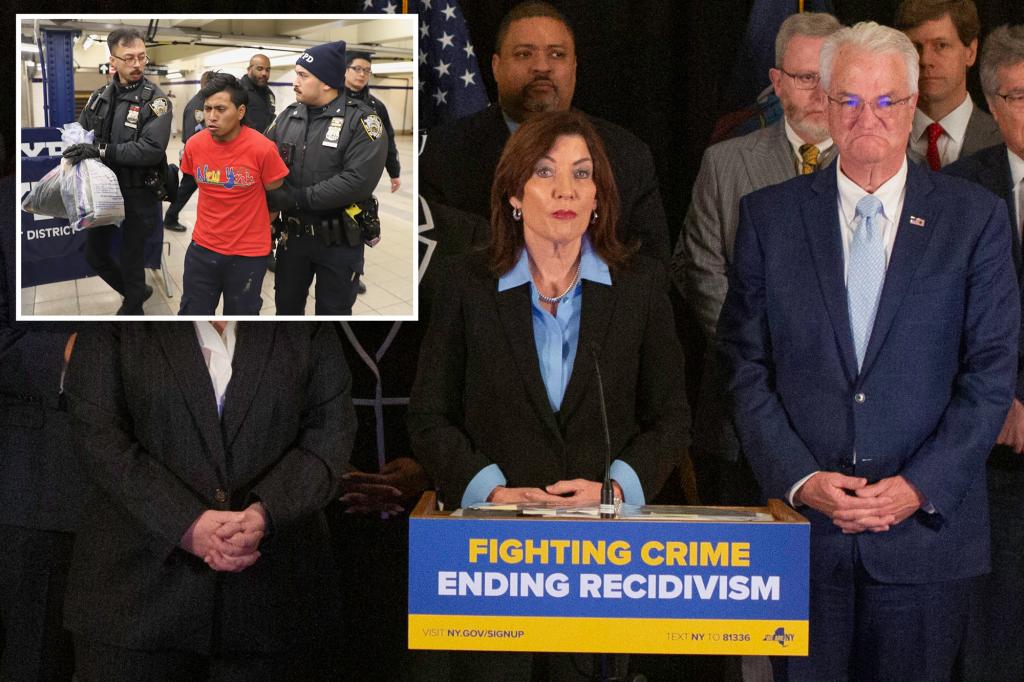Paragraph 1: The Revolving Door of Justice and the Need for Reform
New York Governor Kathy Hochul, flanked by a united front of New York City district attorneys, has announced a legislative push to reform the state’s discovery laws. This bipartisan coalition, spanning from Manhattan DA Alvin Bragg to Staten Island DA Michael McMahon, argues that existing loopholes in the laws have created a "revolving door" of justice, allowing accused criminals to evade consequences on technicalities. They contend that these loopholes impede public safety by permitting individuals arrested for serious crimes to be released and potentially re-offend. Hochul’s proposed reforms, embedded within her $252 billion budget plan, aim to address this issue and reduce the number of cases dismissed on technical grounds.
Paragraph 2: The Crux of the Proposed Reforms
The core of Hochul’s proposal revolves around two key modifications to the discovery process. Firstly, it establishes a 35-day time limit for defense attorneys to challenge alleged discovery violations, starting from the prosecutor’s certification of compliance. This measure aims to prevent strategic delays and "gaming" of the system by defense lawyers who may raise discovery issues late in the process, even after receiving the evidence. Secondly, the proposal narrows the scope of discoverable materials, requiring prosecutors to disclose only evidence directly related to the specific charge, rather than all information "relating to the subject matter of the case." This aims to reduce the burden on prosecutors, who argue that the current broad requirement leads to excessive paperwork and the disclosure of irrelevant information.
Paragraph 3: Statistical Evidence and Case Examples
The urgency of reform, according to Hochul and the DAs, is underscored by a significant increase in criminal case dismissals since the 2019 discovery law reforms. Data from the Office of Court Administration reveals a jump from 41% dismissals pre-reform to 62% in 2023. They cite specific examples of cases dismissed on seemingly minor technicalities, including a subway slashing case where the prosecution failed to disclose a follow-up medical appointment record, even though it contained no new information, and a sex abuse case dismissed due to the delayed delivery of routine custody forms. These examples, they argue, demonstrate how the current law prioritizes procedural minutiae over the merits of the case and the safety of victims.
Paragraph 4: The Impact on Different Crime Categories and the Defense Perspective
The impact of the discovery law’s loopholes extends beyond violent crimes, significantly affecting misdemeanor cases like drunk driving, domestic violence, and retail theft. Staten Island DA Darren Albanese emphasizes the growing trend of dismissals based on "failure to comply" with the 35-day disclosure deadline, often involving evidence unrelated to the core allegations. However, The Legal Aid Society criticizes Hochul’s proposal, accusing prosecutors of manipulating data and attempting to dismantle a successful reform that leveled the playing field. They argue that the proposed changes aim to restore an unfair advantage to the prosecution and undermine defendants’ rights to a fair trial.
Paragraph 5: Political Landscape and Support for Reform
Hochul’s proposal, largely shaped by the five NYC DAs and endorsed by the District Attorneys Association of the State of New York, enjoys bipartisan support among prosecutors, highlighting the perceived need for change. While some district attorneys outside the city, where dismissal rates are lower, agree on the need for action, the proposal faces potential opposition from liberal lawmakers. The 2023 budget negotiations saw intense clashes over proposed bail law changes, indicating a likely struggle for the discovery reforms. Senate Majority Leader Andrea Stewart-Cousins has expressed openness to discussion, but Assembly Speaker Carl Heastie’s position remains unknown. Republican Senator Anthony Palumbo, a former prosecutor, supports the proposal and suggests even stronger measures, such as decoupling discovery requirements from speedy trial rules.
Paragraph 6: A Balancing Act: Transparency vs. Efficiency
The proposed reforms aim to strike a balance between ensuring transparency and streamlining the discovery process. Albany County DA Lee Kindlon, a former defense attorney, believes the proposal represents a reasonable compromise, preserving the core principles of discovery while addressing the unintended consequences of the 2019 reforms. While acknowledging past instances where discovery was withheld until trial, he emphasizes the importance of timely disclosure. The proposal retains the 21 categories of mandatory disclosure, emphasizing a continued commitment to transparency. While some defense attorneys welcome the proposed changes as a step forward, they also note the potential for manipulation by both sides and advocate for further refinements to ensure a just and efficient system.


